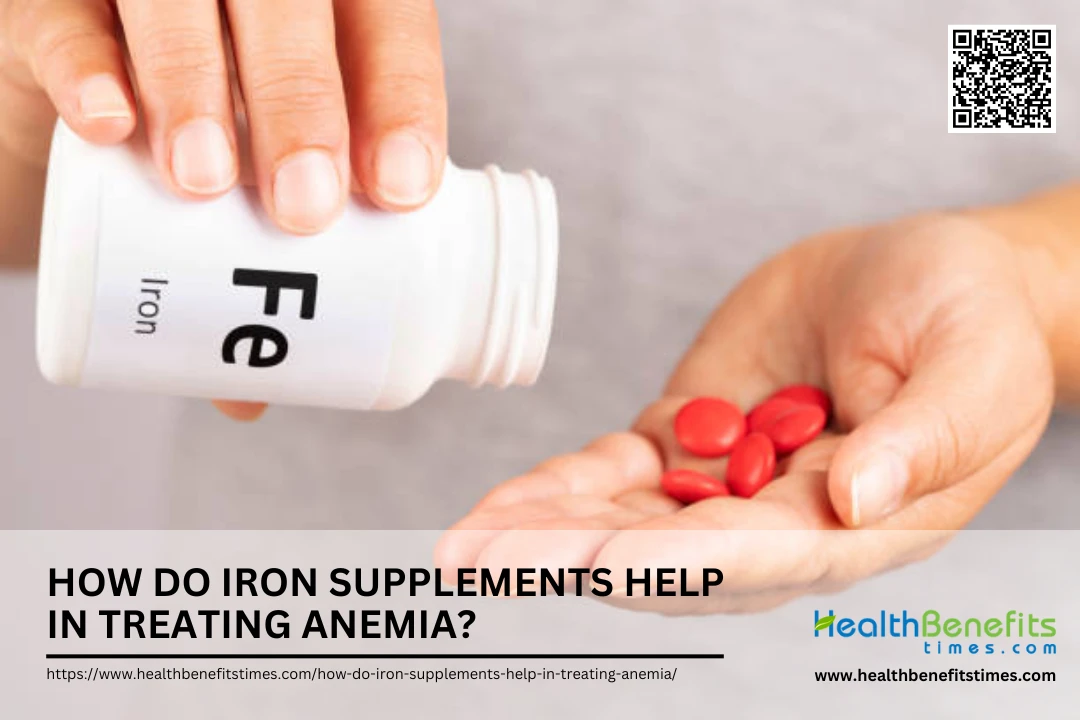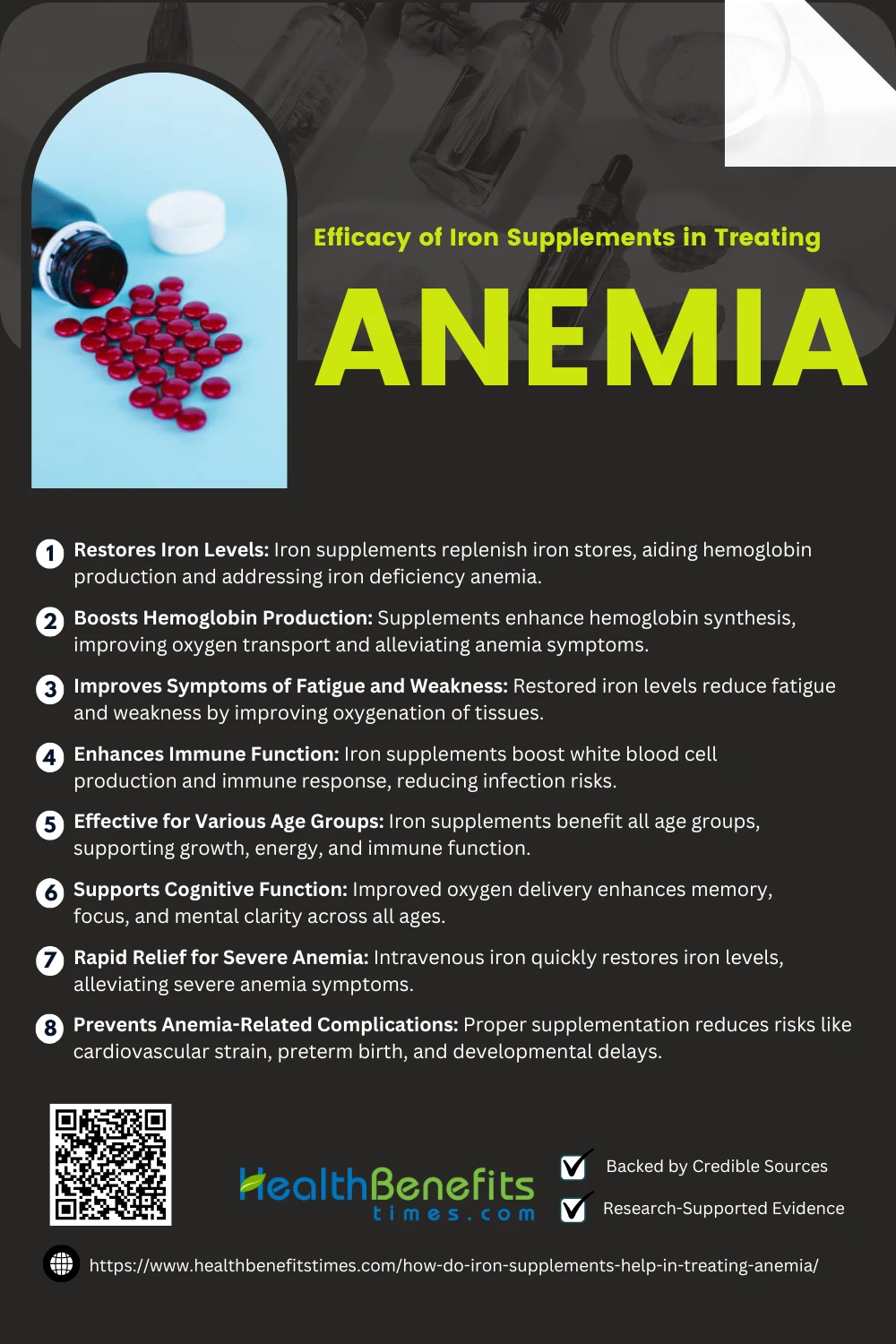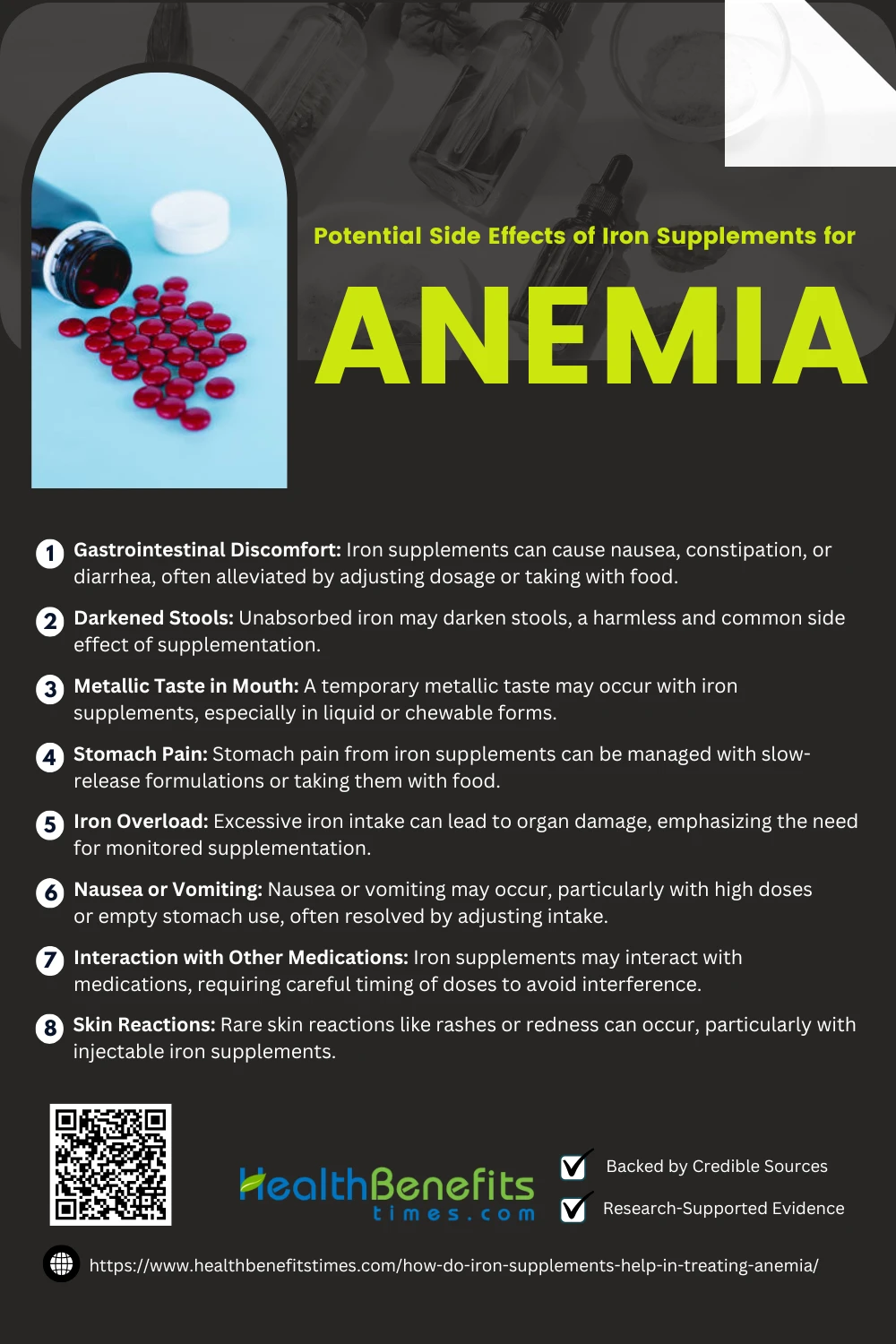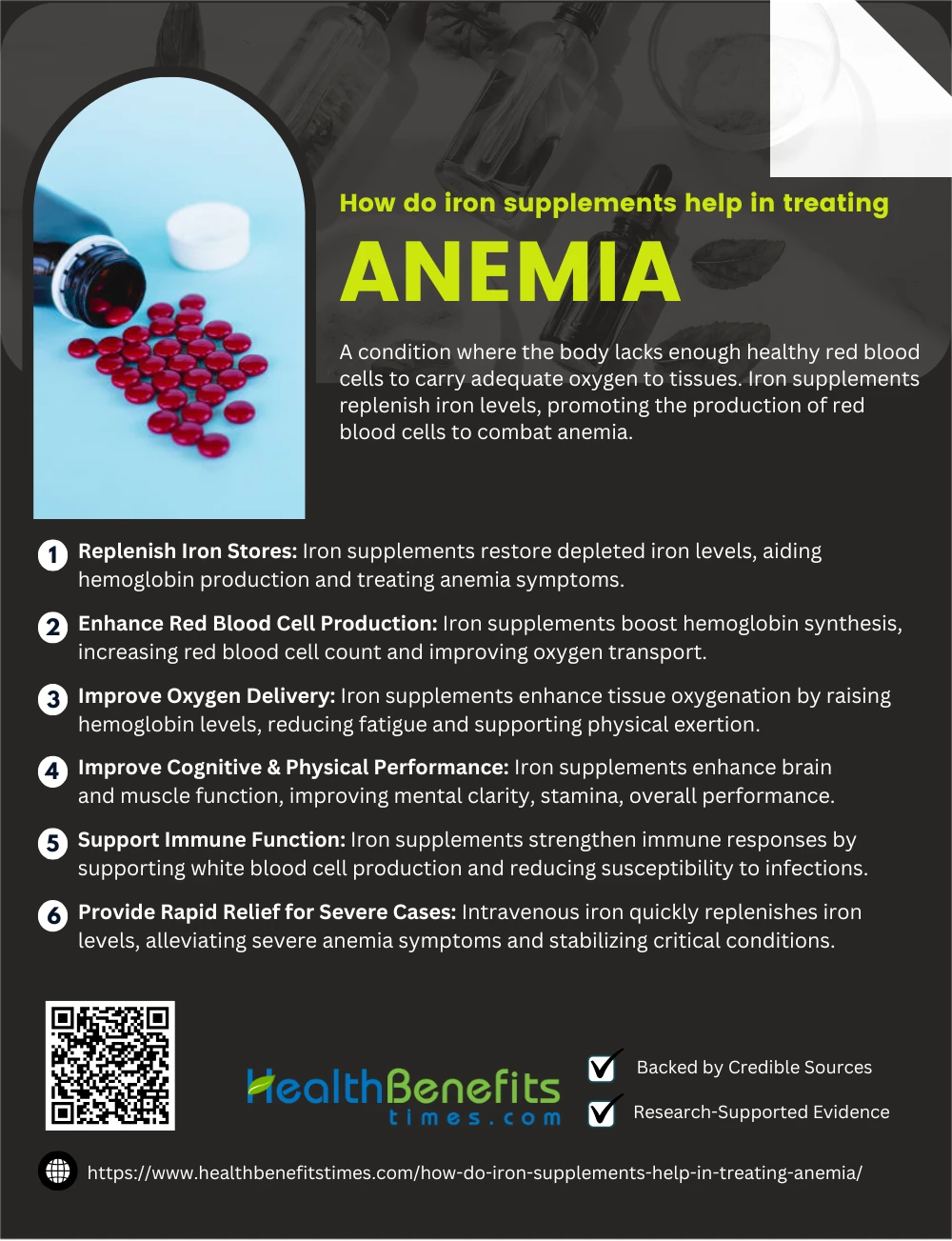- A condition where the body lacks enough healthy red blood cells to carry adequate oxygen to tissues.
- Iron supplements replenish iron levels, promoting the production of red blood cells to combat anemia.
- They are particularly effective in treating iron-deficiency anemia, improving energy levels and overall health.
 Iron supplements are dietary supplements that provide iron, an essential mineral necessary for producing hemoglobin in red blood cells, critical for oxygen transport in the body (1). Anemia, characterized by a reduced number of red blood cells or insufficient hemoglobin levels, is a common condition often caused by iron deficiency. Iron supplements help replenish iron levels in the body, addressing the underlying deficiency and improving red blood cell production, thereby alleviating anemia’s symptoms such as fatigue, weakness, and shortness of breath (2). Research indicates that oral iron supplementation is particularly effective in mild to moderate anemia cases (3). In severe cases, intravenous iron may be required to ensure rapid restoration of iron stores (4). Furthermore, iron supplementation during pregnancy significantly reduces the risk of maternal anemia and its associated complications (5). The efficacy of these supplements is also enhanced when paired with vitamin C, which improves iron absorption.
Iron supplements are dietary supplements that provide iron, an essential mineral necessary for producing hemoglobin in red blood cells, critical for oxygen transport in the body (1). Anemia, characterized by a reduced number of red blood cells or insufficient hemoglobin levels, is a common condition often caused by iron deficiency. Iron supplements help replenish iron levels in the body, addressing the underlying deficiency and improving red blood cell production, thereby alleviating anemia’s symptoms such as fatigue, weakness, and shortness of breath (2). Research indicates that oral iron supplementation is particularly effective in mild to moderate anemia cases (3). In severe cases, intravenous iron may be required to ensure rapid restoration of iron stores (4). Furthermore, iron supplementation during pregnancy significantly reduces the risk of maternal anemia and its associated complications (5). The efficacy of these supplements is also enhanced when paired with vitamin C, which improves iron absorption.
Understanding Anemia
Anemia is a medical condition characterized by a decrease in the number of red blood cells or insufficient levels of hemoglobin, leading to reduced oxygen transport in the body (6). This condition affects individuals worldwide, with iron deficiency being its most common cause. Anemia can range from mild to severe and may result from various nutritional, genetic, and chronic disease factors (7). Its prevalence makes it a significant public health concern requiring timely diagnosis and management (8).
Anemia arises due to diverse causes, with iron deficiency accounting for nearly half of all cases globally (5). Other nutritional deficiencies, including vitamin B12 and folate, also contribute to anemia’s onset (9). Chronic diseases, such as kidney disease, inflammatory disorders, or cancer, interfere with red blood cell production, resulting in anemia of chronic disease. Additionally, genetic disorders like sickle cell anemia and thalassemia affect the structure and function of hemoglobin (10).
The symptoms of anemia vary based on its severity and underlying cause but commonly include fatigue, weakness, and pale or yellowish skin. Shortness of breath and dizziness are often reported, especially during physical activity (7). Severe anemia can lead to chest pain, irregular heartbeats, or cold hands and feet. In children, anemia can result in developmental delays and poor academic performance (1).
Role of Iron in the Human Body
Iron is a vital mineral that plays a crucial role in numerous physiological processes, primarily in the formation of hemoglobin, the protein in red blood cells responsible for oxygen transport throughout the body (6). It is also a key component of myoglobin, which facilitates oxygen storage in muscles, aiding physical performance (11). Iron is essential for energy metabolism and DNA synthesis, making it critical for cellular growth and repair (6). Insufficient iron levels can lead to iron deficiency anemia, causing symptoms such as fatigue, weakness, and impaired cognitive function (9).
How Iron Supplements Treat Anemia?
Iron supplements treat anemia by replenishing iron levels needed to produce hemoglobin, the protein in red blood cells that carries oxygen. This helps restore normal red blood cell production, improving energy and reducing symptoms like fatigue and weakness.
- Replenish Iron Stores
Iron supplements are pivotal in treating anemia by replenishing depleted iron levels, a primary cause of the condition. They help restore the body’s iron stores, enabling the production of hemoglobin, which is crucial for oxygen transport (1). Effective in cases of iron deficiency anemia, these supplements improve red blood cell production (2), energy levels, and overall health (11). They also combat fatigue and weakness (9) and are particularly effective in pregnancy-related anemia (5). - Enhance Red Blood Cell Production
Iron supplements play a critical role in enhancing red blood cell production by boosting hemoglobin synthesis, which is essential for oxygen transport in the bloodstream (1). These supplements aid in reversing iron deficiency anemia by facilitating the development of healthy red blood cells (2). Improved oxygen delivery reduces symptoms like fatigue and weakness (9). In pregnant women, enhanced red blood cell production supports fetal development (5). Intravenous iron therapy offers a rapid increase in red blood cell count in severe cases. Proper iron supplementation improves both energy levels and cognitive performance (11) and strengthens the immune system. - Improve Oxygen Delivery
Iron supplements are essential for improving oxygen delivery in individuals with anemia by increasing hemoglobin levels, the protein responsible for oxygen transport in red blood cells (1). Enhanced hemoglobin synthesis facilitates better oxygenation of tissues, reducing symptoms like fatigue and shortness of breath (2). This is particularly critical during physical exertion, as oxygen demand increases (9). Pregnant women benefit significantly as improved oxygen delivery supports fetal growth (5). Intravenous iron ensures rapid restoration of oxygen delivery in severe cases. It also enhances energy levels (11) and reduces cardiovascular strain caused by anemia. - Improve Cognitive and Physical Performance
Iron supplements play a vital role in enhancing cognitive and physical performance by addressing iron deficiency anemia, which impairs oxygen delivery to the brain and muscles (1). Restored hemoglobin levels improve concentration, memory, and overall mental clarity (2). Improved oxygenation of muscles reduces fatigue and boosts endurance during physical activities (9). These benefits are particularly evident in children and adolescents, supporting academic and physical development (11). Pregnant women also experience enhanced well-being, reducing the risk of maternal exhaustion (5). - Support Immune Function
Iron supplements bolster immune function by supporting the production of white blood cells, essential for defending against infections (1). Iron plays a critical role in creating enzymes that regulate immune responses and fight pathogens (2). Restoring iron levels improves the body’s ability to combat illnesses, particularly in individuals with iron deficiency anemia (9). This is especially vital for children and pregnant women, who are more susceptible to infections (5). Intravenous iron supplementation enhances immune recovery in severe cases. Maintaining proper iron levels ensures a balanced immune response, reducing inflammation and enhancing overall resilience (11). - Provide Rapid Relief for Severe Cases
In severe anemia cases, iron supplements, particularly intravenous iron, provide rapid relief by quickly replenishing depleted iron stores and boosting hemoglobin production (1). This accelerated restoration of iron levels alleviates symptoms such as extreme fatigue and shortness of breath (2). Intravenous iron bypasses gastrointestinal absorption issues, ensuring maximum efficacy (9). Additionally, it helps stabilize critical conditions like anemia-related heart strain (11). Pregnant women and postpartum individuals benefit from faster recovery (5).
Efficacy of Iron Supplements in Treating Anemia
The efficacy of iron supplements in treating anemia lies in their ability to restore iron levels, a critical component for producing hemoglobin and healthy red blood cells. By addressing iron deficiency, the most common cause of anemia, these supplements help improve oxygen transport in the body, alleviating symptoms such as fatigue, weakness, and shortness of breath. Their effectiveness depends on proper diagnosis, adherence to recommended dosages, and addressing any underlying health conditions contributing to the deficiency.
 1. Restores Iron Levels
1. Restores Iron Levels
Iron supplements effectively restore depleted iron levels, addressing the primary cause of iron deficiency anemia. They replenish iron stores, enabling the production of hemoglobin, which is essential for oxygen transport in red blood cells (1). This process improves energy levels and reduces fatigue (2). Oral supplementation is particularly effective for mild cases (9), while intravenous iron provides rapid results for severe anemia.
2. Boosts Hemoglobin Production
Iron supplements are essential in treating anemia as they boost hemoglobin production, the protein responsible for oxygen transport in red blood cells (1). By replenishing iron levels, they enable the synthesis of healthy red blood cells, alleviating anemia symptoms like fatigue (2). Proper supplementation improves energy and overall well-being (9), while ensuring oxygen reaches vital tissues.
3. Improves Symptoms of Fatigue and Weakness
Iron supplements effectively combat anemia-related fatigue and weakness by restoring iron levels necessary for hemoglobin production, which improves oxygen delivery to tissues (1). Enhanced oxygenation alleviates exhaustion and boosts energy levels (2). Regular supplementation significantly enhances physical endurance (9) and overall quality of life.
4. Effective for Various Age Groups
Iron supplements are effective across all age groups, addressing anemia caused by different factors. In children, they improve cognitive development and physical growth (1). For adults, they alleviate fatigue and enhance energy levels (2). Pregnant women benefit from reduced maternal complications (5). Seniors experience improved vitality and immune function (9), while intravenous iron provides rapid results in severe cases.
5. Supports Cognitive Function
Iron supplements enhance cognitive function by improving oxygen delivery to the brain, essential for memory, concentration, and overall mental clarity (1). This benefit is especially vital for children, where it supports academic performance and developmental milestones (2). Adults experience improved focus and reduced mental fatigue (9). In pregnant women, iron aids in fetal brain development (5).
6. Rapid Relief for Severe Anemia
Iron supplements, particularly intravenous iron, provide rapid relief for severe anemia by quickly replenishing iron stores and boosting hemoglobin production (1). This intervention addresses critical symptoms like extreme fatigue and breathlessness (2). Intravenous iron bypasses gastrointestinal absorption issues, ensuring efficient results (9).
7. Prevents Anemia-Related Complications
Iron supplements help prevent anemia-related complications by restoring hemoglobin levels, reducing the risk of cardiovascular strain and irregular heart rhythms caused by oxygen deprivation (1). In pregnant women, they minimize the likelihood of preterm birth and low birth weight (5). Children benefit from improved growth and cognitive development (2). Seniors experience enhanced immunity and vitality (9).
8. Enhances Immune Function
Iron supplements enhance immune function by supporting the production of white blood cells, which are crucial for fighting infections (1). They aid in creating enzymes essential for a robust immune response (2). Restored iron levels reduce susceptibility to illnesses, particularly in children and pregnant women (5). Seniors benefit from improved resilience and reduced inflammation (9). Intravenous iron ensures rapid immune recovery in severe cases (Johns Hopkins Medicine).
Who Should Take Iron Supplements?
Iron supplements are recommended for individuals with iron deficiency anemia, including women of childbearing age due to menstrual blood loss (1). Pregnant women benefit from preventing maternal anemia (5). Children with growth-related deficiencies also require supplementation (2). Seniors with reduced dietary intake or absorption issues may need them (9).
Dietary Sources of Iron and Complementary Strategies
- Heme Iron Sources
Heme iron is the most bioavailable form of iron, meaning it is easily absorbed by the body. Found primarily in animal-based foods such as red meat, poultry, and fish, heme iron supports hemoglobin production and overall health. Including these foods regularly in your diet can help prevent iron deficiency. - Non-Heme Iron Sources
Non-heme iron is derived from plant-based foods, including lentils, beans, spinach, tofu, nuts, and iron-fortified cereals. While its absorption is less efficient than heme iron, non-heme iron can still contribute significantly to iron intake, especially for vegetarians and vegans. - Pair with Vitamin C
Consuming foods rich in vitamin C alongside iron-rich meals can significantly boost non-heme iron absorption. Foods like oranges, strawberries, bell peppers, and tomatoes enhance the body’s ability to utilize the iron from plant-based sources effectively. - Avoid Iron Blockers During Meals
Certain substances, such as tannins in tea and coffee or calcium in dairy products, can interfere with iron absorption. To maximize iron intake, avoid consuming these items simultaneously with iron-rich foods. - Cook with Cast Iron Cookware
Cooking acidic foods like tomato sauce in cast iron cookware can increase the iron content of your meals. The small amount of iron leached from the cookware enhances the nutritional value of these dishes (Johns Hopkins Medicine). - Incorporate Fortified Foods
Iron-fortified foods, such as cereals, bread, and plant-based milks, are excellent sources of dietary iron, particularly for those who may not consume enough iron-rich foods naturally. These options help meet daily iron requirements effectively. - Include Protein-Rich Foods
Protein-rich foods such as eggs, legumes, and nuts often contain non-heme iron. Including these foods in your diet not only contributes to overall nutrition but also supports the body’s ability to replenish iron stores. - Plan Balanced Meals
Combining heme and non-heme iron sources in a single meal can optimize iron intake. For example, pairing lean meat with a spinach salad dressed with lemon juice offers both heme iron and vitamin C, maximizing absorption.
Potential Side Effects of Iron Supplements
Iron supplements are widely used to treat anemia and iron deficiency, but they can sometimes cause side effects that vary in severity. Common issues include gastrointestinal discomfort, such as nausea, constipation, or diarrhea, while higher doses may lead to more serious complications like iron overload or organ damage in rare cases. This listicle explores the potential side effects of iron supplements, offering insights to help users manage and minimize these risks effectively.
 1. Gastrointestinal Discomfort
1. Gastrointestinal Discomfort
Gastrointestinal discomfort, including nausea, constipation, diarrhea, and abdominal pain, is a common side effect of iron supplements, especially when taken on an empty stomach (2). Slow-release formulations or taking supplements with food may alleviate these issues (9). Adjusting dosage under medical supervision can reduce risks (1).
2. Darkened Stools
Darkened stools are a common side effect of iron supplements, caused by unabsorbed iron passing through the digestive tract (2). This change is harmless and does not indicate bleeding (9). It’s essential to follow recommended dosages (1).
3. Metallic Taste in Mouth
A metallic taste in the mouth is a potential side effect of iron supplements, often linked to liquid or chewable forms (2). This temporary taste alteration usually resolves with continued use (9). Consulting a doctor is recommended if symptoms persist (1).
4. Stomach Pain
Stomach pain is a common side effect of iron supplements, especially when taken in high doses or on an empty stomach (2). Switching to slow-release formulations or taking supplements with food can alleviate discomfort (9). Persistent pain warrants medical evaluation (1).
5. Iron Overload
Iron overload, or excessive iron accumulation, can occur from prolonged or high-dose supplementation, leading to organ damage, especially in the liver and heart (2). Symptoms include joint pain, fatigue, and abdominal discomfort (9). Medical consultation is crucial for safe dosing (1).
6. Nausea or Vomiting
Nausea or vomiting is a common side effect of iron supplements, especially when taken on an empty stomach or in high doses (2). Switching to slow-release formulations can minimize symptoms (9). Persistent symptoms require medical evaluation (1).
7. Interaction with Other Medications
Iron supplements can interact with medications like antibiotics, thyroid hormones, and certain antacids, reducing their efficacy (2). To avoid interference, take iron supplements at least two hours before or after other medications (9). Regular monitoring helps prevent complications (1).
8. Skin Reactions
Skin reactions, including rashes, itching, or redness, may occur with iron supplements, particularly with injectable forms (2). Oral supplements rarely cause such effects but should be monitored if symptoms arise (9). Consult a doctor before resuming supplementation (1).
Special Considerations
Iron supplements require careful consideration, especially for individuals with conditions like hemochromatosis, where excess iron can harm organs (2). Pregnant women and vegetarians may need tailored doses due to increased demands or dietary restrictions (9). Medical consultation is essential to adjust supplementation safely (1).
Conclusion
In conclusion, iron supplements play a crucial role in treating anemia by addressing iron deficiency, the most common cause of the condition. By replenishing the body’s iron stores, these supplements enable the production of hemoglobin and healthy red blood cells, improving oxygen delivery throughout the body. This not only alleviates symptoms like fatigue and weakness but also supports overall health. However, their effectiveness depends on proper diagnosis, adherence to prescribed dosages, and addressing any underlying health issues.
References:
- World Health Organization. Iron Supplements.
- Mayo Clinic. Iron Supplementation.
- National Library of Medicine. PubMed.
- Harvard Health. Intravenous Iron Supplementation.
- Centers for Disease Control and Prevention. Iron and Micronutrients.
- Mayo Clinic. Iron in the Body.
- Mayo Clinic. Anemia Overview.
- National Institutes of Health. Anemia Awareness.
- Harvard Health. Nutrition-Related Anemias.
- National Library of Medicine. Thalassemia and Sickle Cell.
- National Institutes of Health. Iron: Health Professional Fact Sheet.


